| Joseph in the Land of Egypt | |
|---|---|
| Directed by | George Roland |
| Based on | "Joseph and His Brethren" |
| Produced by | Samuel Goldstein Mortimer D. Sikawitt |
| Starring | Joseph Green |
| Edited by | Jean Roland |
| Distributed by | Guaranteed Pictures Corporation |
Release date |
|
Running time | 80 min. |
| Country | United States |
| Languages | Yiddish English subtitles |
Joseph in the Land of Egypt (Yiddish title: Yoysef in Mitsraim) is a 1932 American historical drama film directed by George Roland and starring Joseph Green. The film is based on the biblical drama "Joseph and His Brethren". The film is considered to be the first talkie filmed in Yiddish. [1]
Joseph in the Land of Egypt was intended to exploit the burgeoning Yiddish-speaking theater-going in America by introducing them to the new medium of film. Rather than creating an original film, Green took an Italian silent film of Jewish interest and dubbed it in Yiddish. Joseph Green, the producer, also took the starring role of Joseph for himself. [1]
The film was well received by audiences in both the United States and Europe. That summer, Green took his film to Poland, then the largest Jewish center in Europe. Although most theater owners were reluctant to show it there, fearing that it would spark anti-Semitism, he eventually found two theater owners who were willing to show the film during the week of Passover. According to one story, the theater owners barred the door of their office with their bodies and declared that Green could not leave until he agreed to allow them to show the film.
Joseph in the Land of Egypt was an immediate success and had a 30-week run at that theater before making its way through the rest of the country. With the film's success, Green went on to produce several more films in Poland, all of which were considered highlights of the Yiddish cinema.

Ida Kamińska was a Polish actress and director. Known mainly for her work in the theatre, she was the daughter of Avrom Yitshok Kaminski and Ester Rachel Kamińska, known as the Mother of the Jewish Stage. The Jewish Theatre in Warsaw, Poland is named in their honor. In her long career Kamińska produced more than 70 plays, and performed in more than 150 productions. She also wrote two plays of her own and translated many works in Yiddish. World War II disrupted her career, and she later immigrated to the United States where she continued to act. In 1967, she directed herself in the lead role of Mother Courage and Her Children on Broadway. In 1973, she released her autobiography, titled My Life, My Theater.
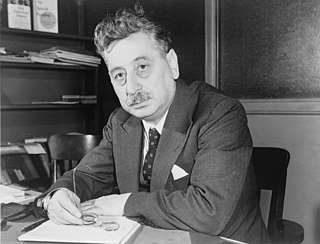
Sholem Asch, also written Shalom Ash, was a Polish-Jewish novelist, dramatist, and essayist in the Yiddish language who settled in the United States.
Yiddish theatre consists of plays written and performed primarily by Jews in Yiddish, the language of the Ashkenazi Jewish community. The range of Yiddish theatre is broad: operetta, musical comedy, and satiric or nostalgic revues; melodrama; naturalist drama; expressionist and modernist plays. At its height, its geographical scope was comparably broad: from the late 19th century until just before World War II, professional Yiddish theatre could be found throughout the heavily Jewish areas of Eastern and East Central Europe, but also in Berlin, London, Paris, Buenos Aires and New York City.
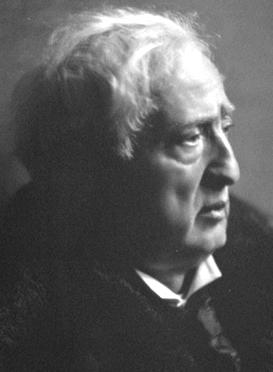
Jacob Pavlovich Adler was a Jewish actor and star of Yiddish theater, first in Odessa, and later in London and in New York City's Yiddish Theater District.
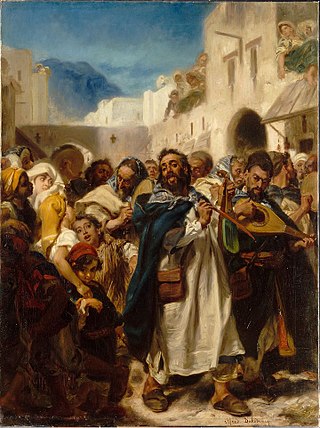
Jewish culture is the culture of the Jewish people, from its formation in ancient times until the current age. Judaism itself is not simply a faith-based religion, but an orthoprax and ethnoreligion, pertaining to deed, practice, and identity. Jewish culture covers many aspects, including religion and worldviews, literature, media, and cinema, art and architecture, cuisine and traditional dress, attitudes to gender, marriage, family, social customs and lifestyles, music and dance. Some elements of Jewish culture come from within Judaism, others from the interaction of Jews with host populations, and others still from the inner social and cultural dynamics of the community. Before the 18th century, religion dominated virtually all aspects of Jewish life, and infused culture. Since the advent of secularization, wholly secular Jewish culture emerged likewise.
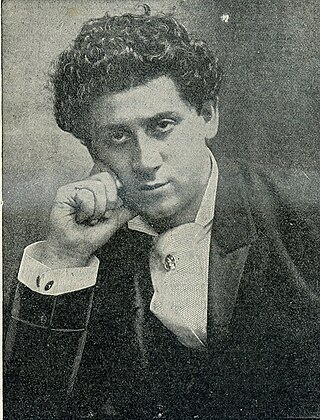
Boris Thomashefsky, born Boruch-Aharon Thomashefsky, was a Ukrainian-born Jewish singer and actor who became one of the biggest stars in Yiddish theater.
The Vilna Troupe, also known as Fareyn Fun Yiddishe Dramatishe Artistn and later Dramă şi Comedie, was an international and mostly Yiddish-speaking theatre, one of the most famous in the history of Yiddish theater. It was formed in and named after the city of Vilnius (Vilna) in the Russian Empire, later capital city of Lithuania. Distinctly Modernist, and strongly influenced by Russian literature and by the ideas of Konstantin Stanislavski, their travels in Western Europe and later to Romania played a significant role in the dissemination of a disciplined approach to acting that continues to be influential in the present day.
Joseph Green, born Yoysef Grinberg, a.k.a. Josef Grünberg, Joseph Greenberg and Joseph Greene, a Polish-born Jew who emigrated to the United States in 1924, was an actor in Yiddish theater and one of the few directors of Yiddish-language films. He made four Yiddish films that he shot on location in Poland, beginning in 1935: Yidl mitn fidl, Der Purimspiler, Mamele, and A brivele der mamen. He also wrote the screenplays for the films, except for Mamele.

David Pinski was a Yiddish language writer, probably best known as a playwright. At a time when Eastern Europe was only beginning to experience the Industrial Revolution, Pinski was the first to introduce to its stage a drama about urban Jewish workers; a dramatist of ideas, he was notable also for writing about human sexuality with a frankness previously unknown to Yiddish literature. He was also notable among early Yiddish playwrights in having stronger connections to German language literary traditions than Russian.

Maurice Schwartz, born Avram Moishe Schwartz, born in the Volhynia province of the Russian Empire, was a stage and film actor active in the United States. He founded the Yiddish Art Theatre and its associated school in 1918 in New York City and was its theatrical producer and director. He also worked in Hollywood, mostly as an actor in silent films but also as a film director, producer, and screenwriter.

Yidl Mitn Fidl, is a 1936 musical Yiddish film.

Bruce Adler was an American Broadway actor. After debuting on the Broadway stage in the 1979 revival of Oklahoma!, he went on to a career that saw him nominated for Tony Awards as Best Featured Actor in a Musical for Those Were the Days (1991) and Crazy For You (1992). His film work was limited to voice work in animated films, notably providing the singing voice for the peddler of the 1992 Disney film Aladdin and the 1996 sequel Aladdin and the King of Thieves.
Miriam Kressyn, one of the "First Ladies of the Yiddish Theater", acted and sang on stage, film and radio; she wrote plays as well.

Green Fields is a 1937 American comedy-drama Yiddish film directed by Edgar G. Ulmer and Jacob Ben-Ami. The film features child actor Herschel Bernardi, later to be an adult star on Broadway, in films and on television.
Zalmen Mlotek is an American conductor, pianist, musical arranger, accompanist, composer, and the Artistic Director of the National Yiddish Theatre Folksbiene (NYTF), the longest continuous running Yiddish theatre in the world. He is an internationally recognized authority on Yiddish folk and theater music and a leading figure in the Jewish theatre and concert worlds. As the Artistic Director of the NYTF for the past twenty years, Mlotek helped revive Yiddish classics, instituted bi-lingual simultaneous English and Russian supertitles at all performances and brought leading creative artists of television, theatre and film, such as Itzhak Perlman, Mandy Patinkin, Sheldon Harnick, Theo Bikel, Ron Rifkin, and Joel Grey, to the Yiddish stage. His vision has propelled classics including NYTF productions of the world premiere of Isaac Bashevis Singer's Yentl in Yiddish (1998), Di Yam Gazlonim and the 1923 Rumshinky operetta, The Golden Bride (2016), which was nominated for a Drama Desk Award and listed as a New York Times Critics Pick. During his tenure at the NYTF, the theatre company has been nominated for over ten Drama Desk Awards, four Lucille Lortel Awards, and has been nominated for three Tony Awards. In 2015, he was listed as one of the Forward 50 by The Forward, which features American Jews who have had a profound impact on the American Jewish community.
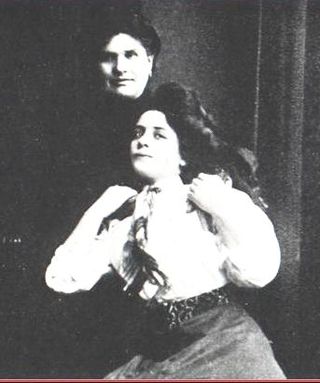
Clara Young was a Yiddish theatrical actor. Born to parents who loved the stage, she spent her early years in a home that housed rehearsals of traveling Yiddish theater troupes. After her father's death, the family went to America, where she soon joined the Tantsman company and went to Boston, there to Zolotarevski's troupe in Montreal, thence to Toronto and to Morris Finkel's theater in Philadelphia.

The Irving Place Theatre was located at the southwest corner of Irving Place and East 15th Street in the Union Square neighborhood of Manhattan, New York City. Built in 1888, it served as a German language theatre, a Yiddish theatre, a burlesque house, a union meeting hall, a legitimate theatre and a movie theatre. It was demolished in 1984.

Pepi Litman was a cross-dressing female Yiddish vaudeville singer associated with the Broderzinger movement. Litman led a popular traveling theater troupe around Europe, performing highly satirical songs while costumed as a male Hasidic Jew. Because she frequently performed while costumed as a young boy or as a male dandy, she is considered a proto-drag king performer. Pepi Litman made numerous 78rpm recordings which capture her energetic and virtuosic singing style, and which also stand as a document of Jewish life in Eastern Europe.

Yiddish cinema refers to the Yiddish language film industry which produced some 130 full-length motion pictures and 30 shorts during its heyday from 1911 and 1940. Yiddish film almost disappeared after World War II, due to the Holocaust and the linguistic acculturation of Jewish immigrants, though new pictures are still made sporadically.
Joseph Seiden was a pioneering American Yiddish language film producer of the early twentieth century. He released a large number of low-budget, sentimental Yiddish dramas during the 1930s and 1940s. He also directed Paradise in Harlem, a 1940 musical film with an African American cast.